10. Le grand blond avec une chaussure noire (Yves Robert, 1972)
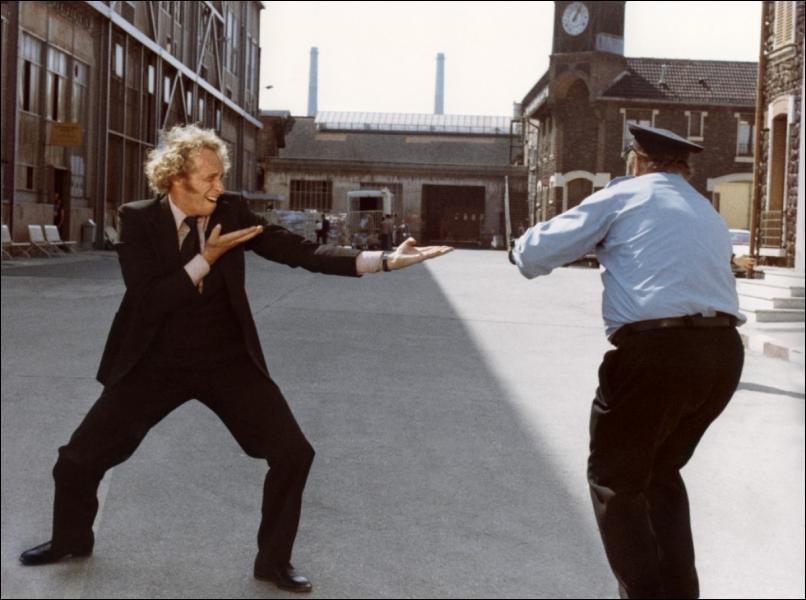
“Le grand blond avec une chaussure noire” is very often overlooked, underrated, and sometimes forgotten by critics, although it won a Silver Bear award. This movie has a subtle but very interesting way of mixing mystery, crime, and comedy. It’s a comedy movie without a doubt, but it includes the twists and turns of an espionage story.
François Perrin is a violinist who plays in an orchestra. He gets caught in a plot to discredit Bernard Milan, the second-in-command of Frances’s Counter-Espionage department, who hopes to supplant his own boss, Louis Toulouse, as first-in-command. In a room full of hidden microphones, Toulouse sends his subordinate, Perrache who knows that the room is bugged, to make Milan, who is listening, believe Perrache will go to meet a spy.
Perrache chooses someone randomly from the crowd of an airport and the chosen one is Perrin, who as the result of a practical joke, stands out from the crowd because is wearing a black shoe on one foot and a red-brown one on the other. Milan takes the bait and starts investigating and pursuing this innocent man, who is unaware of what is going on, getting caught up in this funny and strange course of events.
9. Les tontons flingueurs (Georges Lautner, 1963)
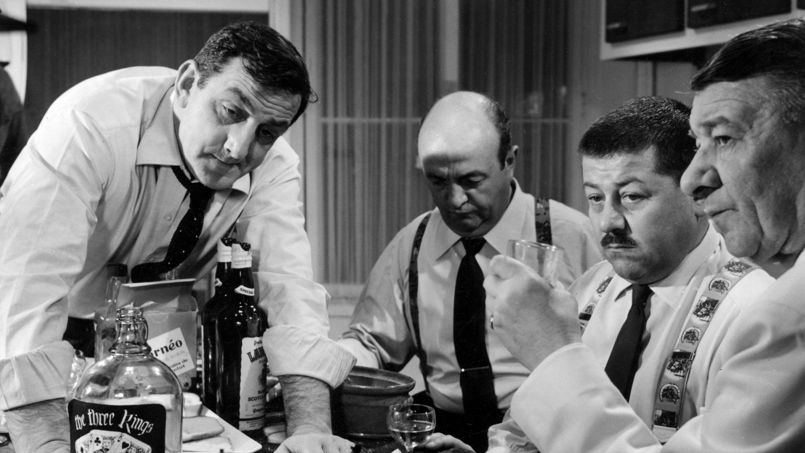
Lino Ventura plays Fernand Naudin, an ex-gangster who has been out of the business for over 15 years. Now he is an agriculturist who deals in machinery and is currently living in Montauban, a quiet village in the south of France. It’s another one of those movies that, at the time of its release, didn’t get the reception it deserved, but later grew in critics’ minds as a comedy classic. It’s a great comedy and one of the first of the genre with an entangled crime and mystery storyline as well as excellent comedic moments.
“The Mexican” is a mafia boss, who is dying and wishes to name a successor, never trusting his own associates. Fernand, The Mexican’s childhood friend, is called to his death bed.
Although not having seen each other for years, The Mexican names him his successor, asking him to take over the business and take care of his daughter, Patricia, who is a rebel and only wants to party. Fernand has to face the succession of former associates who wanted to take The Mexican’s place. Fernand must avoid betrayal and threats on his life, but his biggest challenge is dealing with a young, rebellious girl.
8. Intouchables (Olivier Nakache & Eric Toledano, 2011)
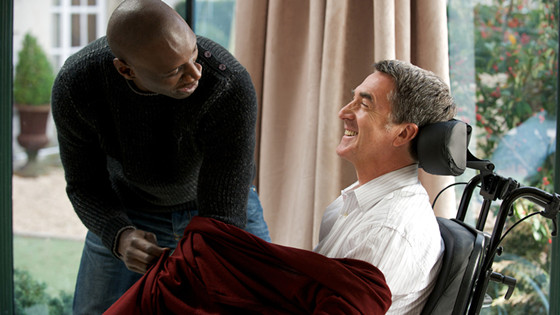
It’s another comedy-drama on the list, and this one has a very powerful message that, sometimes, may overpower the comedic fluency. The movie is based on a true story and conveys a very strong and powerful message of friendship. The story is majorly told in flashback and later brought back to the present where the main characters are together.
Basically, the friendship only started by pure chance. Driss is unemployed and only looks for job in order to get a signature that proves he was interviewed, and therefore continue to receive his welfare benefits. Philippe is a very rich quadriplegic who is interviewing candidates for the position of live-in caregiver.
Driss is one of the candidates. He is told to appear the next day and in that day he will have his desired signature. The next day he appears and he is told that he is employed on a trial period, much to his surprise. From then onwards a series of funny and surprising events occur that solidify and perpetuate their friendship.
7. Le fabuleux destin d’Amélie Poulain (Jean-Pierre Jeunet, 2001)

Also simply called “Amélie,” the film became the platform for many romantic comedies, mixing an extravagant depiction of contemporary France with sweet comedic moments.
A character who is the symbol of ostracism in modern-day France, Amélie is a shy waitress, isolated from others, who decides to anonymously change other people’s lives for the better. The movie is presented with fast-paced imagery and a quite innovative manner of filming for the time, at least in terms of the French industry. It presents some fantastical comedic moments and, just like its main character, these moments have some romantic characteristics that enrich the comedic component.
It was adapted to a musical and rightly so. “Amélie” does have that sweet, comedic, magical element that goes along perfectly with musical adaptations, due to its fast-paced and whimsical depiction of life. “Amélie” may very well be the first of the new breed of French movies that came after its release in 2001.
6. La cage aux folles (Édouard Molinaro, 1978)
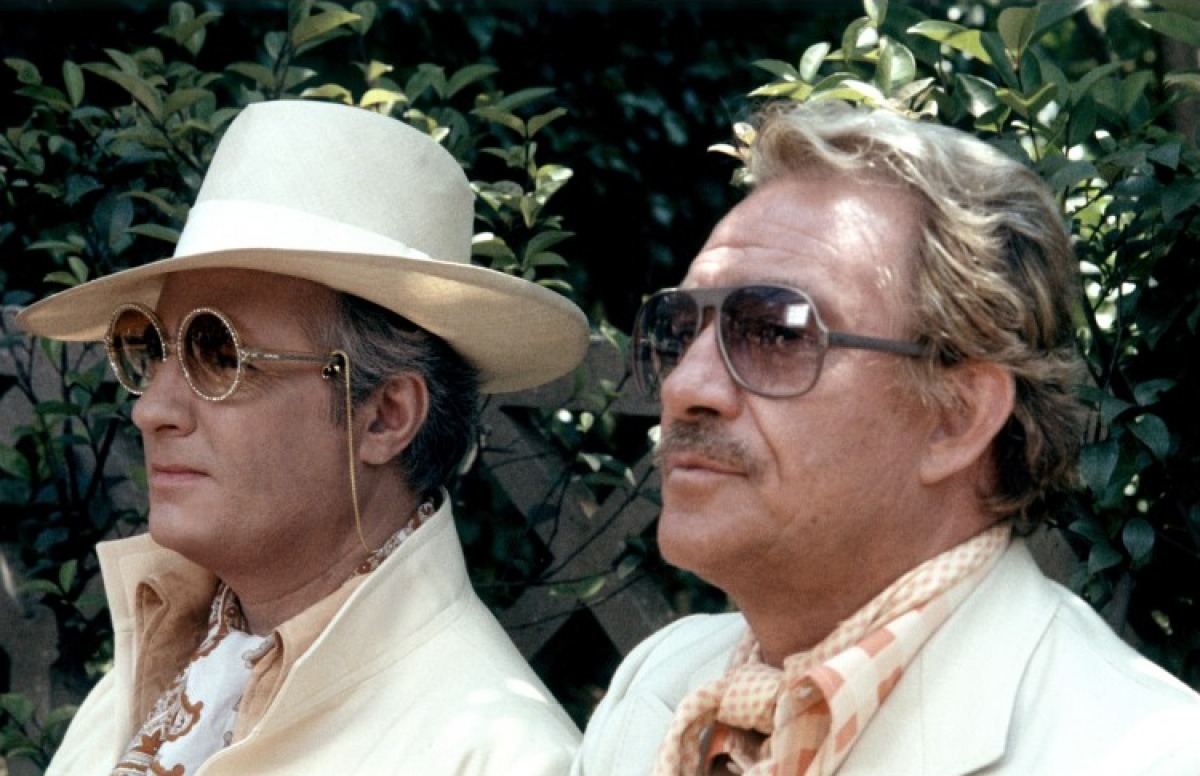
“La cage aux folles” was an instant classic, nominated to three Academy Awards. It is also highly recommended as a superb comedy with two amazing and unexpectedly accurate performances by the Italian legend Ugo Tognazzi and French legend Michel Serrault. It was adapted several times on stage and, later, on screen with Robin Williams and Nathan Lane as protagonists in the American remake.
Renato, a manager of a gay nightclub, and Albin, its star attraction, are a gay couple who have been together for 20 years. Renato was once married to a woman and had a child with her. Now the son, all grown up, wants to get married to a woman, shaking the foundations of the gay couple who will have to endure some tribulations in order to fool the ultra-conservative parents of Renato’s son’s fiancé.
The plot is quite catchy, immediately attracts attention, and adds a certain degree of controversy to such a taboo subject. Tognazzi and Serrault are still today quite respected as legendary actors and this film made their status grow even more. Their performances are simply superb, and although the plot of the movie is quite daring and original, their performances put this movie up the “stairs of Cinema’s comedy greats” and make it a must-see movie for comedy buffs.
5. Le Roman d’un tricheur (Sascha Guitry, 1936)

It is not often you see this movie in such a high position on a list of great films. Although recognized as a classic, the movie itself is somewhat forgotten in the French industry.
What merits the film’s position on this list is its wittiness, originality, intelligence, and creativity—and, of course, it’s clever and daring humour. It is one of those movies you watch once and never want to watch again due to the fear that a second viewing might ruin the initial magic. Aging and reviewing a movie can damage one’s perspective.
The film tells the story of the incredible life of a cheat, played by the writer and director Sascha Guitry. The Cheat narrates is own life story while writing his own memoirs. There is almost no dialogue and the movie is mostly told through narration. The Cheat becomes self-conscious regarding his own actions and tries along the way to mend his life with varying degrees of success.
4. Oscar (Édouard Molinaro, 1967)

Although quite underrated, and not often mentioned as one of the top movies of Louis de Funès’ career, this is a magical film. It is creative and original with an entangled, complex, and sometimes confusing plot that makes it mandatory viewing for comedy buffs. Also, Louis de Funès’ performance is top-notch with non-stop dialog and over-the-top scenes that make the movie look like a theatre play.
Louis de Funès plays Bertrand Barnier, married, father of a daughter, and an industrialist who owns a large company, which employs Christian Martin, played by Claude Rich, a simple accountant. One morning Martin goes to his boss’s house and asks for a raise, which is immediately refused by Barnier.
What his boss doesn’t know and is about to find out is that the simple and modest accountant has stolen millions of francs by falsifying the company records. Barnier threatens him with the police, but his employee reminds him that submitting false records is a major and serious crime, so not only would the company go bankrupt, but Barnier would also lose everything he has.
Martin wins over his boss and is nominated as the company’s Vice-President and gets his raise. Martin then reveals that he wishes to marry Barnier’s daughter, causing Barnier to lose his mind. Barnier then asks his future son-in-law to get the money, so he can give it to his daughter as a wedding present, but Martin reveals he has converted the money into jewelry and that the jewelry is in a bank. Barnier tells him to go get the jewels. But Martin will only do this if Barnier signs a document, which he does.
The plot thickens with a dance of the briefcase with the jewelry going from hand to hand, confusion of identities, a daughter who falls in love the chauffeur, an accountant who is not in love to his boss’s daughter after all, and a volatile and unstable wife. Barnier deals with all of this and much more over the course of one morning.
3. Mon Oncle (Jacques Tati, 1958)
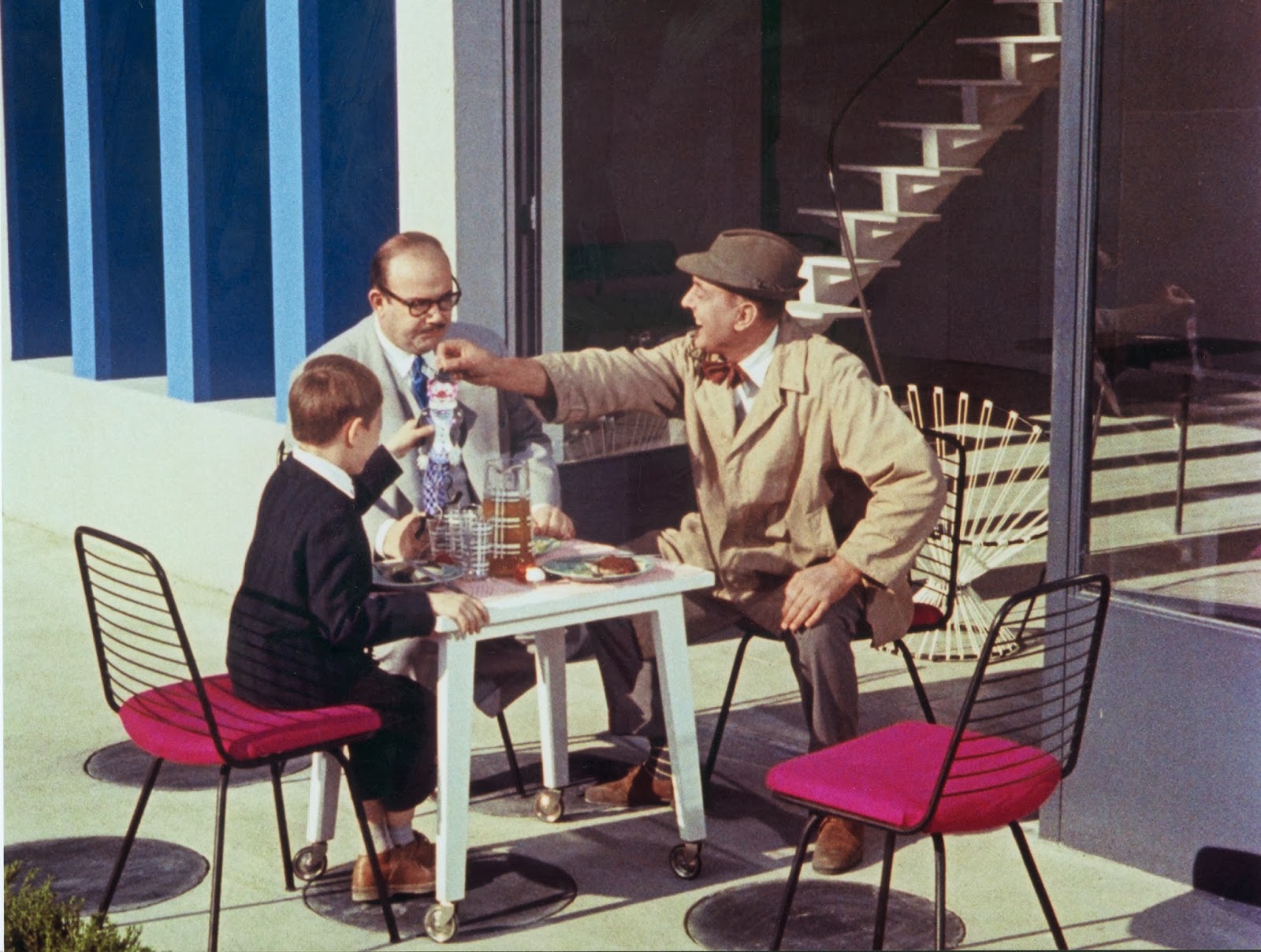
“Mon Oncle” has a different approach to humor than “Play Time,” much more direct and straightforward and more based on Monsieur Hulot’s stupidity and bad luck. Sometimes it’s difficult to distinguish who is the stupid: Hulot or the others? Most of the time, Hulot is the one leading a comfortable life and dealing with problems one at a time.
Again, this movie presents a social and industrial satire of French economic development that is becoming more and more mechanic and less human. The inept and out-of-place Monsieur Hulot is adorable and loved by his nephew and spends the day at his sister’s house. The house is symbolic of the exaggerated mechanical development of the French society, due to its impersonality and lack of functionality, lacking in comfort and personal disposition. The design and appearance are its most important qualities.
By contrast, Hulot’s house doesn’t have these mechanisms, and although living in a modest neighborhood, he has a happy living with healthy interpersonal relationships and human contact. He walks and takes his motorized bicycle almost everywhere, and it’s with him that his nephew feels more “at home.”
2. La Grande Vadrouille (Gérard Oury, 1966)
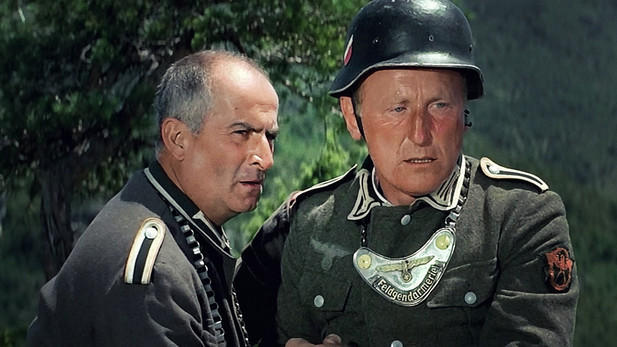
A landmark in French comedy history, the movie is most known for the participation of the legendary comedy actor, Louis de Funès, playing Stanislas Lefort who, alongside Augustin Bouvet (portrayed by André Bourvil), is trapped in one of the funniest manhunts in Cinema history. Until 2008, the movie was the most successful French movie in history.
It’s the summer of 1941, and the Nazis are winning the war. Three British airmen parachute out over Paris, which is now dominated and controlled by the Nazis. They run away and try to hide from the Nazis, and end up running into two very funny characters, Augustin Bouvet, a house painter, and Stanislas Lefort, a conductor of the Opéra National de Paris, who end up running with the British airmen and doing everything possible, with the help of the Resistance, to escape from the Nazis.
1. Playtime (Jacques Tati, 1967)
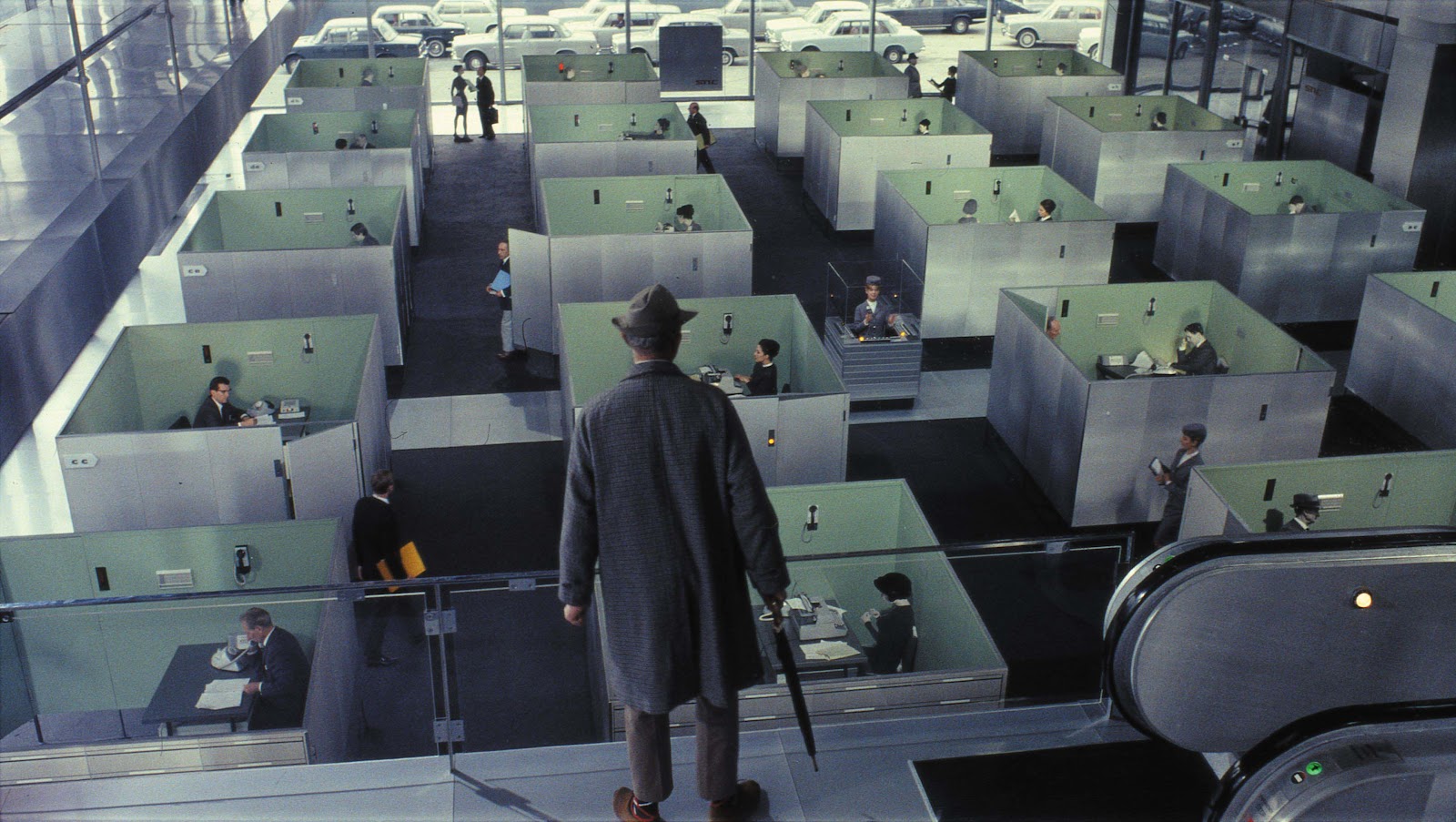
Jacques Tati’s “Playtime” (1967) is perhaps his most recognizable film, adored by critics and the public alike. His fourth major movie, “Playtime” is considered one of the best comedies of all time. In addition to directing, Tati also plays the main role, his most endearing character, Monsieur Hulot.
Although it was filmed on a set, which was built specifically for the occasion, the movie creates a daring and original landscape out of Industrial France in the ’60s. This was a time characterized by development and innovation and a growing industrial metropolis.
The movie has six sequences interconnected by two characters, Monsieur Hulot and Barbara, who encounter each other over the course of a single day. The movie is widely known for its subtle action, visual comedy, and sparse dialogue, which is of almost no importance to the plot.
Author Bio: João Braga is a content writer and freelance translator of 5 different languages. His passion for movies began 12 years ago, starting with Bergman, Kurosawa and Truffaut’s movies. He has a “soft spot” for the intelligent and genial French Cinema.